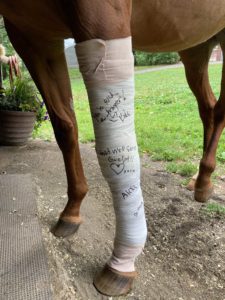#AskTheVet with Dr. Megan Hays
Question:
What exactly is cellulitis? Can a horse have chronic cellulitis? What is the best way to treat it?
Answer:
Cellulitis is a bacterial infection of the skin and tissue layers below the skin. In horses, limbs are most commonly affected and present as a sudden onset of mild to severe swelling with warmth and pain to palpation of the limb. Fever and lameness are common with cellulitis. Horses may be so painful that they are reluctant to move at all, making it important to have your horse evaluated by a veterinarian in order to rule out other potential injuries or causes of lameness. While cellulitis is seen all year round, it is particularly prevalent in wet months.
There are many different causes of cellulitis including decreased lymphatic drainage, pastern dermatitis, or wounds
It is not uncommon for horses that develop cellulitis to be more prone to have recurring bouts in the future. Keeping your horse’s legs free from dermatitis or other skin conditions, decreasing risk of trauma to the limbs, and keeping the limbs dry after bathing and turnout are all good preventative measures. Occasionally, one cellulitis bout may become a chronic condition for the horse. Due to the sudden onset of severe swelling, horses may develop lingering inflammation within the lymphatic vessels in the leg, causing decreased lymph drainage from the leg resulting in a chronically thick or swollen leg even after the pain, heat, and infection are cleared. Your veterinarian will help assess the extent and possible causes of your horse’s cellulitis and develop a treatment plan for each individual case.
Recent Posts
About Us
At B.W. Furlong & Associates, we are progressive leaders delivering the ultimate in veterinary care to our equine patients and clients in both the hospital and ambulatory setting. We have several associated practices offering exemplary care and services in New Jersey, Florida, and Virginia
